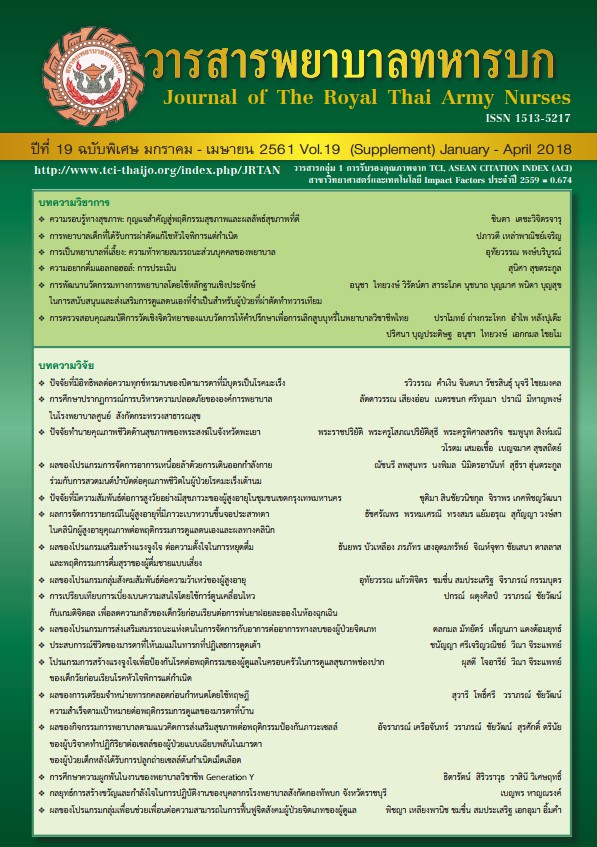Lived Experience Of Breastfeeding Mothers With Breast-Refusal Infants
Keywords:
lived experience, breastfeeding mothers, breast-refusal infantsAbstract
This qualitative research study used Heidegger phenomenological interpretation approach. The purpose was to describe the meaning and experiences of breastfeeding mothers with breast-refusal infants. The informants were mothers 6 to 12 months postpartum who had experiences of breastfeeding and breast-refusal infants since the infants were born to 6 months of age. Data were collected by using the in-depth interview with tape-record and found saturated after 13 informants. Data were analyzed by using van Manen method. This study was supported by Graduate School and Faculty of Nursing, Chulalongkorn University The findings revealed the meaning of maternal experiences with breast-refusal infants as an imperfect mother who could not breastfeed her baby and yet had to fight against her own baby will. The experiences of mothers in breastfeeding for infants with breast-refusal could be categorized into 4 major themes as follows: 1) difficulties in and suffering from breastfeeding due to confusion and inability to find the cause, the fear of baby not getting enough milk, feeling guilty and self-blaming, being disappointed and sad and tired with discourage 2) finding the way to get over the problems by looking it like a small problem and trying to have positive thinking, trying everything to get the baby breastfeed, searching knowledge from social network, consulting friend who had experience, building goals for herself 3) being patient and trying to get the best things for the baby, and 4) important surrounding supports from husband, family and relative, and the baby as the inspiration.
Downloads
References
2. Worobey J. Why some mothers stop Breast-feeding Self- reported reasons for switching to formula. Topics in clinical nutrition. 2011; 26: 229-233.
3. Lamontagne G., Hamelin M.A. Pirre S.M. The breast feeding experience of women with major difficulties who use the services of a breastfeeding clinics: a descriptive study. International breastfeeding Journal. 2008; 1-17.
4. Mohrbacher N., Stock J. La Leche League International The Breastfeeding Answer Book. 3rd. Schaumburg : Illinois; 2003.
5. Payakkaraung S. Practice Guideline for Breastfeeding: Common Problems in Infants. In Vichitsukon K, et. al., editors. Breastfeeding. Bangkok:
Pre-one; 2012. p. 1-10. (in Thai)
6. Jirapaet K. Breastfeeding: common problems. In Punnahitanon S., editor. Update and Practical points in Preterm Care. Bangkok: Active print; 2014. p. 8-20. (in Thai)
7. Sangtawesin V. Prevention and Resolving Common Problems in Babies Breastfeeding. In Muttamara S, et. al., editors. Breastfeeding
Textbooks. Bangkok: Aiyara; 2012. p. 175-186. (in Thai)
8. Australian Breastfeeding Association. Breastfeeding: when your baby refuses the breast. Australia: Australian Breastfeeding Association; 2013.
9. Chusilp K. Breastfeeding with baby health. In Muttamara S, et. al., editors. Breastfeeding Textbooks. Bangkok: Aiyara; 2012. p.33-34. (in Thai)
10. Lawrence R.A. and Lawrence R.M. Breastfeeding: A guide for medical profession. 7th. St. Louis: Mosby; 2011.
11. UNICEF Thailand. The Survey situation of children and women in Thailand by Multiple Indicator Cluster Survey (MICS) December 2005-May
2006. Bangkok : UNICEF; 2006. (in Thai)
12. Ministry of Public Health. Health fact sheet. 2013; 7: 1-2. (in Thai)
13. Laopannarai N. Outcome of lactation intervention in neonates with nipple confusion at QSNICH : Pilot study. [Thesis]. Bangkok: Queen sirikit national institute of child health; 2012. (in Thai)
14. van Manen M. Researching lived experience. Ann Arbor, MI : Edwards Brothers; 1990.
15. Murphy E. “Breast is best”: infant feeding decisions and maternal deviance. Sociology of Health and Illness. 1999; 21 : 187-208.
16. Riordan J., Wambach K. Breastfeeding and human lactation. 4td. United states of America: Jones and Bartlett; 2010.
17. Suwanna Chanapai et al. Knowledge, Attitude, Self-Efficacy, Spousal and Nurse Support Predicting 6-weeks Exclusive Breastfeeding.
Journal of nursing science 2014; 32(1): 51-60. (in Thai)
18. Linclon Y. S., Guba E. G. Naturalistic inquiry. California : Sage; 1985
19. Wongphinit U, Sinsuksai N, Yusamran C. Personal Factors, Social Support and Effective Suckling at Discharge in Predicting Exclusive Breastfeeding
at one Month Among First-Time Mothers. Journal of The Royal Thai Army Nurses. 2016; 17(1): 88-95. (in Thai)
Downloads
Published
How to Cite
Issue
Section
License
บทความหรือข้อคิดเห็นใดใดที่ปรากฏในวารสารพยาบาลทหารบกเป็นวรรณกรรมของผู้เขียน ซึ่งบรรณาธิการหรือสมาคมพยาบาลทหารบก ไม่จำเป็นต้องเห็นด้วย
บทความที่ได้รับการตีพิมพ์เป็นลิขสิทธิ์ของวารสารพยาบาลทหารบก
The ideas and opinions expressed in the Journal of The Royal Thai Army Nurses are those of the authors and not necessarily those
of the editor or Royal Thai Army Nurses Association.






